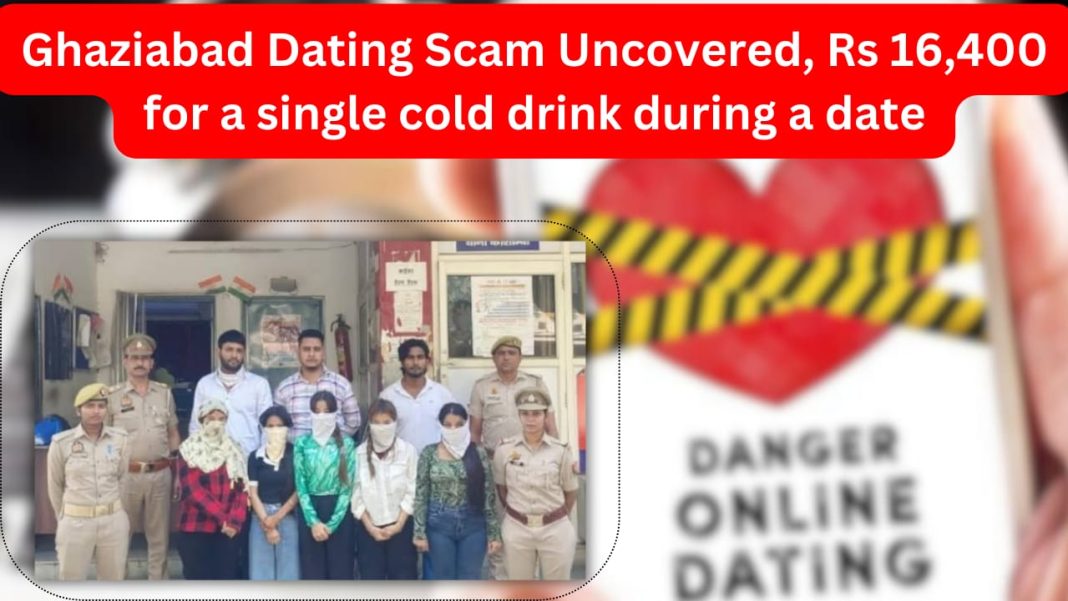Digital News Desk:
A recent dating scam in Ghaziabad has revealed how digital platforms are being exploited to carry out fraudulent activities and extort money, raising concerns over the safety of online dating and socializing in India. The incident involved a Delhi man who was charged an exorbitant Rs 16,400 for a single cold drink during a date arranged through an online platform, underscoring the vulnerability of individuals to scams and the need for increased caution.
The Incident and How It Unfolded
The victim, a man from Delhi, was lured into meeting a woman through a dating application, reportedly under the pretense of a typical social gathering. According to local reports, after agreeing to meet her at a designated spot in Ghaziabad, he found himself being charged an outrageous amount for a cold drink, a scenario that quickly escalated as the scammers demanded the payment and threatened consequences if he failed to comply.
The scam’s mechanism relied on the creation of a high-pressure situation, commonly employed in extortion scams. Such incidents have become increasingly common across India, especially in large cities where social networking apps are widely used. Victims are often manipulated into meeting in controlled environments where scammers can leverage social intimidation to extract money. This form of scam not only targets the victim financially but also plays on fears of public embarrassment, leaving many hesitant to report the crime.

Rise of Digital Dating Scams in India
Digital dating scams have surged in recent years as more individuals turn to online platforms to find companionship or socialize. According to cybersecurity experts, these scams often begin with simple online exchanges that quickly turn into orchestrated schemes for monetary gain. In Ghaziabad and similar urban areas, scammers create fake profiles on popular dating apps, using various persuasive tactics to establish trust with their targets before luring them into extortion scenarios.
The modus operandi varies but typically includes meeting in secluded locations where accomplices can coerce the victim. In many cases, the location might be a venue where exorbitant charges are justified under false pretenses, such as inflated prices for drinks, food, or service fees. In extreme cases, scammers threaten victims with public humiliation, often recording interactions to strengthen the psychological pressure.
Law Enforcement and the Legal Challenges
Local law enforcement in Ghaziabad has launched an investigation into the incident, and authorities have urged citizens to exercise caution when using dating apps. However, police face challenges in tracing the suspects as many scammers use temporary numbers, fake identities, or disposable SIM cards that make tracking difficult. Additionally, the social stigma associated with falling victim to such scams often prevents individuals from reporting these cases, further complicating law enforcement efforts.
The Ghaziabad incident is part of a broader trend in India where digital platforms, particularly dating apps, have become hotbeds for criminal activity. Legal experts argue that existing laws, though stringent, need better enforcement and increased public awareness. The Information Technology Act of 2000 and amendments made to it address some aspects of online fraud, but the enforcement requires more digital literacy and vigilance from users, according to cyber law specialists.
Steps Being Taken to Combat Digital Fraud
The Indian government and cybersecurity agencies have recognized the growing issue of online fraud, which encompasses not only dating scams but also phishing, identity theft, and financial fraud. The Ministry of Electronics and Information Technology (MeitY) has taken steps to educate the public on digital safety, while initiatives such as the Indian Cyber Crime Coordination Centre (I4C) aim to centralize efforts in tackling cybercrime across states.
Prime Minister Narendra Modi recently emphasized the need for digital awareness, pointing out that thousands of fake online identities, including dating profiles and fraudulent phone numbers, have been blocked by the government in an attempt to curb cyber fraud.
This reflects a broader strategy to tighten digital security measures, yet experts argue that educating users on recognizing red flags is equally crucial.
Preventative Measures for Online Daters
As scams become more sophisticated, the importance of preventative measures becomes evident. Cybersecurity professionals suggest that users verify profiles thoroughly and avoid meeting strangers in isolated or unfamiliar locations. Limiting the sharing of personal details and avoiding financial transactions in early interactions are also recommended practices. Users are advised to be wary of profiles that appear too good to be true, as scammers often create elaborate stories and identities to lure victims.
The Indian government, along with various private organizations, is working on increasing digital literacy among citizens. Campaigns focused on educating the public about common online threats aim to reduce the number of victims falling prey to these schemes. Furthermore, dating apps are under increasing pressure to implement stricter verification processes and better security protocols to protect users.

The Broader Social Implications
The Ghaziabad dating scam incident highlights the darker side of India’s digital evolution. While online platforms offer unprecedented connectivity, they also create new avenues for crime. Scams like this one underscore the need for an updated legal framework that can keep pace with rapidly evolving online tactics used by scammers.
Moreover, the psychological impact on victims can be profound. Individuals who fall victim to such scams often experience shame, guilt, and anxiety, which may prevent them from seeking help or reporting the crime. Raising awareness, encouraging open dialogue, and promoting a culture where victims feel safe to report incidents are essential steps in addressing the psychological toll and preventing further harm.
Conclusion
The Ghaziabad dating scam serves as a cautionary tale about the vulnerabilities inherent in online interactions, particularly on dating apps. It underlines the need for vigilance, both from individual users and from service providers who must prioritize user safety. Law enforcement agencies and government bodies are gradually increasing their focus on digital scams, yet public awareness remains the most effective line of defense. In a rapidly digitalizing India, the importance of cybersecurity literacy cannot be overstated as more individuals rely on digital platforms for social connections.
Ensuring that every user is equipped to identify potential threats is key to preventing similar incidents, safeguarding individuals, and fostering a secure digital landscape.
You May Also Read: Mumbai’s Bandra Station Stampede Reflects Risks of Overcrowded Rail Stations During Festive Season








